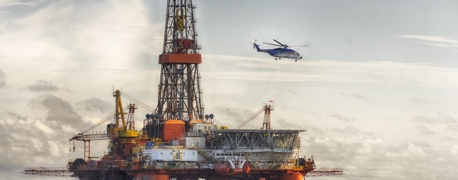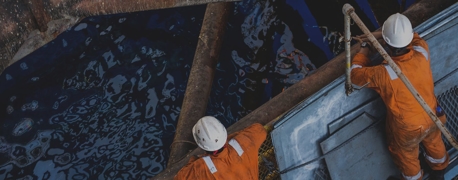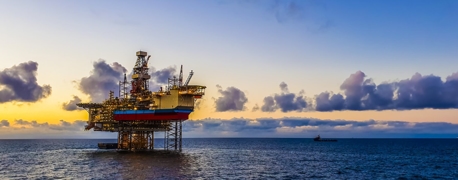5 Ways Hurricanes Affect Offshore Workers & Their Families

It’s currently the height of hurricane season, and the 2021 season has been particularly notable. Recent weather patterns have been intense, with government scientists saying that this year’s hurricanes are likelier than usual to be “above average” in strength. Hurricane Ida, which made landfall on the sixteenth anniversary of Hurricane Katrina, has been recorded as one of the strongest hurricanes in U.S. history.
But while hurricanes affect all of us, there’s no one who feels their impact more than offshore workers and their families. Today’s blog is dedicated to revealing what offshore workers go through when a major storm hits, and what risks they face every time they head out to sea during hurricane season.
#1: Temporary Loss of Income
When hurricanes approach, most offshore rigs are directed to shut down operations and evacuate the crew to shore. The problem is that if a worker is making an hourly wage, evacuations mean lost hours. That loss of income could be tough for single-income families, especially as hurricane evacuations could last for several days.
#2: Increased Fuel Prices
Hurricanes can cause over 90% of the Gulf of Mexico’s oil and gas production to shut down. The sudden loss of productive capacity can cause fuel prices to spike, which affects everyone. However, for offshore workers who lose work hours due to hurricanes, a spike in prices could hurt even worse than they might otherwise.
If that’s not enough, consider the fact that people need more fuel than usual during a hurricane to keep their generators running. An offshore worker’s family could be in for a tough month when those factors combine.
#3: Separation During Potential Disaster
Let’s face it: hurricanes are scary. Any force of nature that can uproot trees, rip the roofs off of houses, or flood entire neighborhoods is worth a healthy dose of fear. Unfortunately, many offshore families have to emotionally and logistically prepare for disaster without their main breadwinner or parental figure.
#4: Higher Likelihood of Work-Related Injury
When you work offshore, your health and safety are vulnerable to serious weather patterns. Without enough time to prepare for evacuation, the pressure of an oncoming storm can make workers rush through their duties, commit mistakes, and endanger themselves and others. In some cases, employers don’t commit to evacuating in time, causing these mistakes indirectly. Ultimately, the employer is responsible for providing adequate time for evacuation.
For instance, the crew of the Globetrotter II was stranded at sea during Hurricane Ida when Noble and Shell failed to evacuate them in time. As a result, enormous swells crashed against the vessel for hours, nearly capsizing the ship several times. Workers were thrown against the walls, causing them painful and long-lasting injury.
Our firm is now representing several crew members of the Globetrotter II against both Noble Corp. and Shell.
#5: Life-Changing Trauma
Few human beings are mentally equipped for the horrors of being at sea during a hurricane, and arguably no one is equipped for enduring a hurricane when they’re on an unseaworthy vessel. Hurricanes can last for hours, even days, inflicting permanent trauma on offshore workers who are stranded at the mercy of 150-mph winds.
For instance, last year, Hurricane Zeta tore a barge named Thor away from Port Fourchon while 18 men remained on board. The hurricane swung the barge into several vessels and objects, pulling it nearly six miles offshore before the anchor held it in place. The men weren’t evacuated for 14 hours.
In 2015, a shipping vessel called El Faro steered into Hurricane Joaquin despite having a history of catastrophic power loss. There were 33 souls on board, none of whom were ever found. The El Faro wreckage was recovered weeks later. Those final few hours were partially documented on the vessel’s recorder.
In both those cases (and in the case of the Globetrotter II), the crews were unsure if they were going to survive the hurricane. Those hours of uncertainty and constant terror can inflict traumatic stress with lifelong implications.
The Advocate for Offshore Workers & Their Families
The crews mentioned in the above incidents have something else in common: when they needed to hold those companies accountable, their families called on Arnold & Itkin for help. We are currently representing crew members of the Thor and Globetrotter II, and we secured confidential recoveries for the three widows of El Faro crew members who turned to us.
Our firm is not only fighting for results; we’re fighting to uncover the truth. When offshore workers and their families go through the worst experiences of their lives, they want to know why. And they want to force their wrongdoers to admit what they did. For these crew members and their families, that’s what we’re committed to doing. No matter what.


